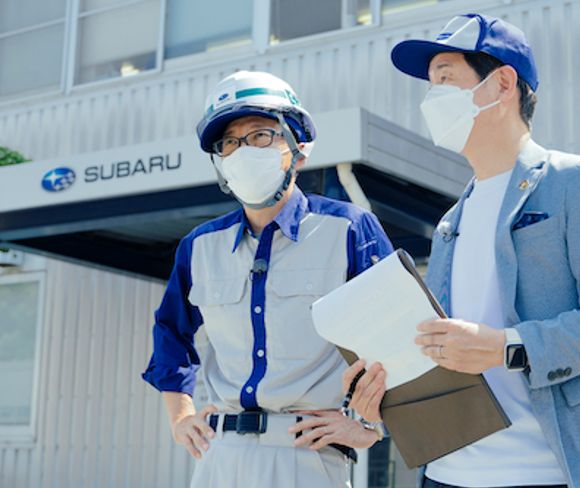The Oizumi Plant of SUBARU’s Gunma Manufacturing Division has greatly streamlined the quality assurance process for engine camshafts by employing artificial intelligence. Developed in collaboration with Fujitsu, the AI system heightens the accuracy of camshaft grinding and enables SUBARU to achieve optimum camshaft quality and production throughput without the need for time-consuming manual inspection.
Challenges
To maximize the benefits of the shift to smart factories utilizing IoT and AI, there was a need to further improve quality assurance technology for component machining processes.
Solutions
High-accuracy AI modeling for camshaft grinding quality assurance with a dedicated system for AI model lifecycle management.
Outcomes
- Consistently high quality of mass produced camshaft components.
- Reduction of production line downtime and grinding process waste materials and parts.
- Development of a quality assurance system that can potentially be applied to a wide range of other manufacturing processes.
This technology enables us to assess the quality of components the moment they are produced, without measuring each one individually.
Suguru Ohba, Manager, DX Planning, Manufacturing Engineering Management Department, Manufacturing Division, SUBARU Corporation
About the customer
SUBARU (formerly Fuji Heavy Industries) is a Japanese manufacturing company that is a major player in the automotive and aerospace industries. SUBARU automobiles are driven by people around the world and are particularly known for their superior rough-road and of f-road performance. The Oizumi Plant, one of the automotive plants in the company’s Gunma Manufacturing Plant, is primarily engaged in the production of automobile engines and transmissions.
AI modeling—because quality is the top priority
In July 2018, SUBARU announced “STEP,” a medium-term management vision that defined enhanced manufacturing quality as the company’s highest priority. Based on this vision, it has implemented wide-ranging production reforms, including the incorporation of advanced IoT and AI technologies to operations within its Gunma Manufacturing Division.
As part of this initiative, SUBARU sought to develop technologies that would enable it to assure the highest possible quality at each stage of the manufacturing process. It focused first on camshafts, which are a critical engine component, seeking to improve quality assurance in the grinding process. To do so, it needed to create an AI model that would enable it to assess component quality by analyzing grinding machine spindle power, vibration, and other operating parameter data.
Fujitsu, which has a strong track record and expertise in this technology, was selected as a technology partner for the introduction of the AI model. Working together, the two companies proceeded to develop an experimental prototype system. “The resulting proposal was not a mere ‘sales pitch,’ it was the outcome of a unique collaboration involving the committed people and technologies,” says Mr. Ohba, Manager, DX Planning, Manufacturing Engineering Management Department, Manufacturing Division. One of the reasons SUBARU chose Fujitsu as its partner was Fujitsu’s commitment to find an AI solution. They didn’t just want to sell SUBARU a technology product—they were determined to develop an AI solution to address a broad range of manufacturing issues. Fujitsu engineers were posted to the SUBARU factory and the two companies continuously collaborated in face-to-face meetings held to address issues and concerns.
Real-time monitoring of AI models for improved accuracy
The experimental prototype system confirmed that AI models are able to predict processing quality with high accuracy. But engineers discovered that over time, accuracy began to decline due to production equipment wear and environmental changes. They knew that they would need to address this issue before the system could be implemented on a mass production line.
So SUBARU and Fujitsu engineers put their heads together and came up with a way to centrally manage the lifecycles of the various AI models that had been deployed on edge devices across the factory floor. Using Fujitsu’s COLMINA manufacturing industry solution, they found they could continuously monitor and verify the prediction accuracy of AI models by matching the inferred results of the AI models with actual quality inspection results of the parts in real time. With this central management capability, degradation of AI modeling accuracy is prevented because operators can re-tune the models as soon as discrepancies between predicted and actual values arise.
Expanding implementation to accelerate manufacturing DX
Now that the COLMINA quality assurance AI system on the Oizumi Plant’s production line is fully operational, camshaft quality is more consistent than it ever was with conventional inspection techniques, which consisted mainly of spot checks. And because manufacturing and evaluation are conducted simultaneously, faulty components can be quickly identified and removed from the production line to prevent disruption of subsequent processes. The result has been a significant reduction in wasted materials, parts, and work time.
Mr. Ohba, who is in charge of the system, praises it highly. “This technology enables us to assess the quality of components the moment they are produced, without measuring each one individually.” Based on his experience with the system, he believes it has wide-ranging potential that can be applied to other components and production bases of the Gunma Manufacturing Division. “By ef fectively using digital data, we aim to achieve a higher level of quality assurance than is possible with conventional methods, and expect to gain a competitive advantage in quality and manufacturing,” he says. “To achieve these goals, we will continue to revolutionize manufacturing through further co-creation initiatives with Fujitsu.”









